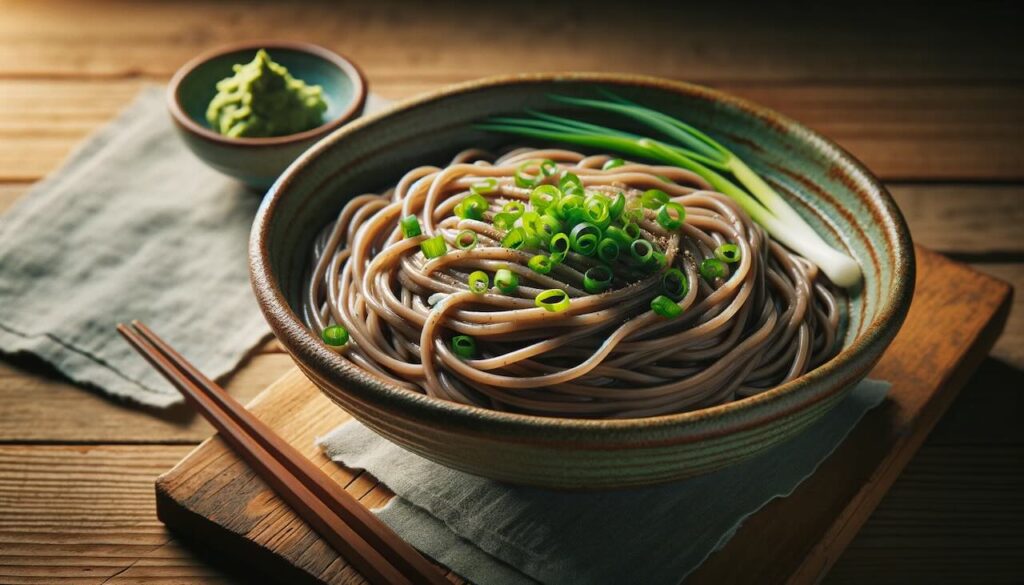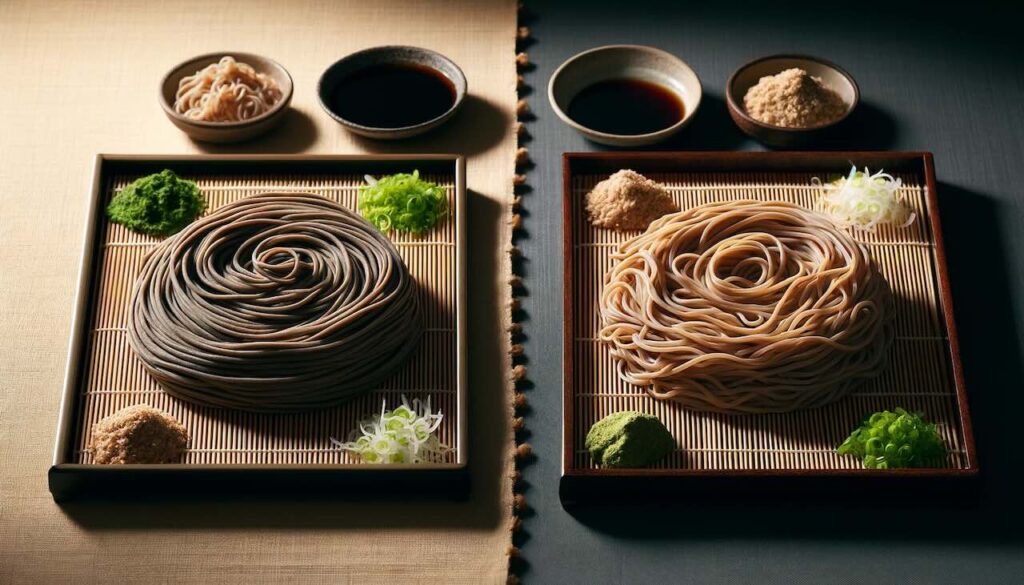Soba noodles hold a special place in Japanese cuisine — earthy, satisfying, and deeply intertwined with centuries of history and cultural tradition. But soba is far more than just a flavorful noodle. It represents a fascinating journey of agricultural adaptation, culinary craftsmanship, and nutritional wisdom that has endured for over a thousand years.
In this article, we’ll explore soba’s ancient origins, its cultural rise in Japan, and the impressive health benefits that continue to make it a cherished part of Japanese food culture.
For a complete guide to soba’s varieties and cultural significance, visit:
👉 The Complete Guide to Soba: Japan’s Ancient Noodle Tradition Explained
The Origins of Soba: From Mountain Grain to National Dish
Soba (蕎麦), made primarily from buckwheat flour, is believed to have arrived in Japan from continental Asia, where buckwheat cultivation dates back thousands of years. Buckwheat thrived in Japan’s mountainous regions where rice farming was difficult, allowing soba to take root as an essential food source.
The earliest Japanese reference to soba appears in the Hitachi no Kuni Fudoki, a regional chronicle from the Nara period (710–784 CE). Initially, buckwheat was primarily valued for its medicinal properties and nutritional resilience, especially in harsh climates.
During the Kamakura period (1185–1333), soba cultivation expanded as communities in mountainous areas embraced it as a reliable staple. Over time, soba’s culinary role grew from porridge-like preparations to the refined noodles we know today.
By the Edo period (1603–1868), soba had become a beloved fixture of urban dining culture. The rise of sobakiri-ya (early soba shops) in cities like Edo (now Tokyo) made soba a popular food for merchants, travelers, and artisans, especially as late-night sustenance paired with sake.
To learn more about how soba shops evolved from izakaya-like pubs to modern soba restaurants, visit:
👉 The Surprising Origins of Soba Shops: From Edo Izakaya to Sobagaki as a Sake Snack
What Makes Soba Nutritionally Unique?
Soba is celebrated not only for its cultural legacy but also for its exceptional nutritional profile. Buckwheat, though often mistaken for a grain, is actually a seed, rich in plant-based protein, fiber, vitamins, and minerals.
In 100 grams of dry soba noodles, you typically find:
- Calories: ~344 kcal
- Protein: 14.4 g
- Dietary Fiber: 6.8 g
- Vitamin B1 (Thiamine): 0.42 mg
- Vitamin B2 (Riboflavin): 0.16 mg
- Niacin: 3.3 mg
- Iron: 2.4 mg
- Magnesium: 133 mg
- Zinc: 1.9 mg
- Rutin: ~12 mg
Among these nutrients, rutin stands out. This unique flavonoid, abundant in buckwheat, may help strengthen blood vessels, improve circulation, and reduce inflammation. Its potential cardiovascular benefits have contributed to soba’s reputation as a longevity-supporting food.
Soba for Balanced Nutrition and Active Lifestyles
Soba’s nutritional composition makes it appealing for a wide range of health-conscious eaters:
- Weight Management:
High fiber content promotes satiety, helping to control calorie intake. - Muscle Support:
With over 14g of protein per 100g, soba supports muscle repair and maintenance. - Sustained Energy:
Its complex carbohydrates provide long-lasting fuel, making it popular among athletes and active individuals.
Of course, soba’s health impact depends on how it’s served. Heavily salted dipping sauces, fried tempura toppings, or rich broths can increase sodium and calorie content. Simpler preparations — such as chilled zaru soba or broth-based kake soba with seasonal vegetables — allow you to fully enjoy soba’s health potential.
For a closer look at the different types of soba and how their flour ratios affect flavor, texture, and nutrition, visit:
👉 Juwari Soba vs. Nihachi Soba: Understanding the Differences in Taste, Texture, and Nutrition
A Note on Allergies
While soba is highly nutritious, it’s important to note that buckwheat can trigger severe allergic reactions in some individuals. In Japan, soba is one of the top allergens and restaurants often display clear warnings. Those with known buckwheat allergies should avoid soba entirely.
Soba as a Symbol of Japanese Food Culture
Beyond nutrition, soba holds a unique place in Japanese cultural life. It’s eaten during key seasonal events such as toshikoshi soba (New Year’s Eve soba), symbolizing longevity and resilience. Its deep historical roots, regional variations, and year-round adaptability reflect many core values of Japanese food culture: simplicity, seasonality, and mindfulness.
To discover how soba fits into Japan’s seasonal and ceremonial traditions, visit:
👉 The Complete Guide to Soba: Japan’s Ancient Noodle Tradition Explained
Conclusion: A Food That Nourishes Body and Heritage
Soba noodles are far more than a delicious dish — they embody centuries of Japanese culinary ingenuity and cultural wisdom. From its humble beginnings as a mountain grain to its status as a national treasure, soba continues to offer nourishment not only for the body but also for the spirit.
Whether you’re seeking a nutritious meal, exploring Japanese culture, or simply enjoying a warm bowl on a cold day, every bite of soba connects you to a long and meaningful tradition that remains very much alive.


